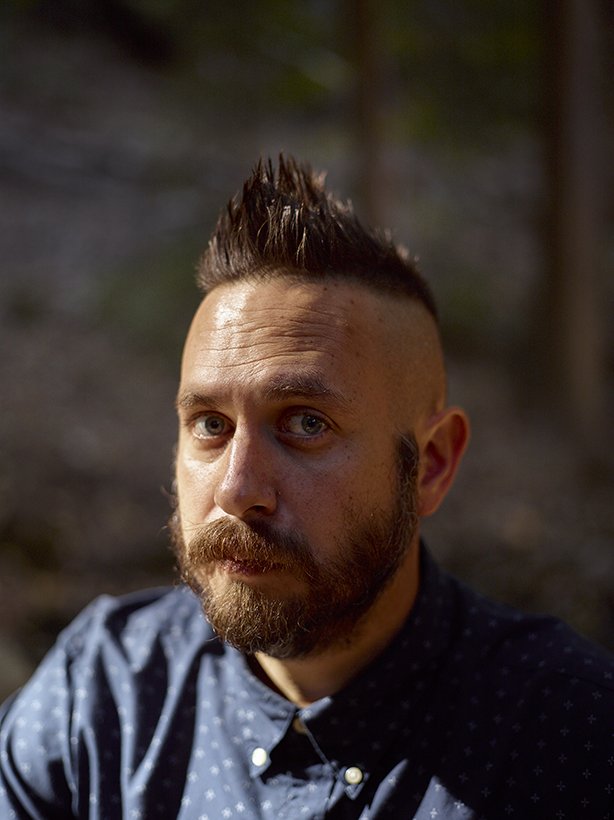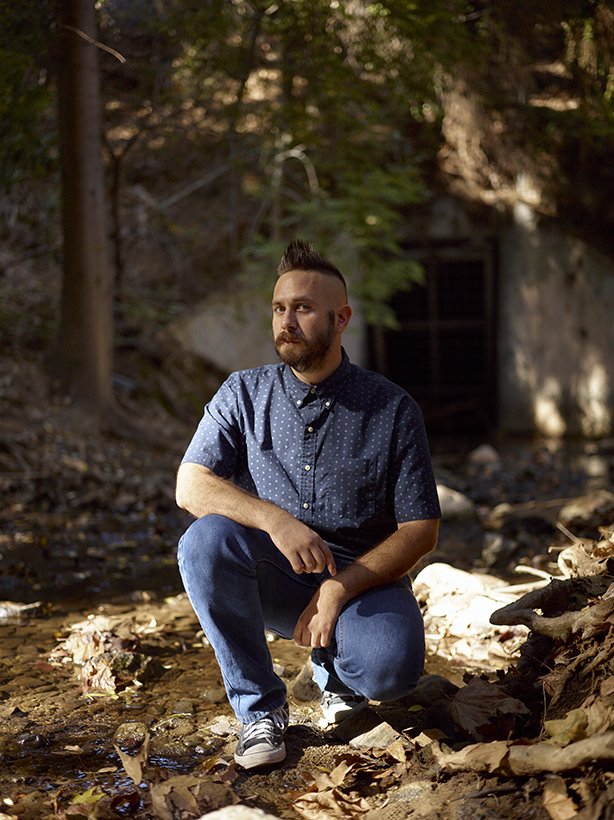David A. Romero is a Mexican-American spoken word artist from Diamond Bar, CA. Romero is the author of My Name Is Romero (FlowerSong Press), a book reviewed by Gustavo Arellano (¡Ask a Mexican!), Curtis Marez (University Babylon), and founding member of Ozomatli, Ulises Bella.
By Matt Sedillo
Photography Damon Casarez
Photography Damon Casarez
April 13, 2023, 10:00 AM PST
Romero has received honorariums from nearly a hundred colleges and universities in thirty-four different states in the USA and has performed live in Mexico, Italy, and France. Romero's work has been published in literary magazines in the United States, Mexico, England, Scotland, and Canada. Romero has opened for Latin Grammy winning bands Ozomatli and La Santa Cecilia. Romero's work has been published in anthologies alongside poets laureate Joy Harjo, Lawrence Ferlinghetti, Luis J. Rodriguez, Jack Hirschman, and Tongo Eisen-Martin. Romero has won the Uptown Slam at the historic Green Mill in Chicago; the birthplace of slam poetry. Romero offers a scholarship for high school seniors interested in spoken word and social justice, "The Romero Scholarship for Excellence in Spoken Word."
You have been making noise in the poetry scene now for some 17 years. You seen waves of poets come and go. What is the secret of your longevity?
Obsession, I guess. A lot of poets get involved at one venue, or maybe a handful of venues, or maybe they're chasing fame, or chasing a publishing deal, or success in the world of competitive poetry, and kind of burn out after a while. So many, reasonably, find something in the larger world: a new career, a partner, kids, that pulls them in a different direction. Poetry isn't very lucrative; only for those at the very top. You have to be obsessed to keep it going.
I've had enough success to bolster my obsession. I became a successful nationally-touring poet over the last decade. More importantly, I did it without a manager or an agent. I built my website, made my promotional materials, wrote my sample contract, developed the workshops and presentations, sent the booking emails, got on the phone, and had the in-person meetings to secure bookings and build connections. My first two books were self-published, self-edited, and self-formatted. I've spent so much time performing and developing my career as a poet, It's tied into almost every facet of who I am. I've learned new skills over the years to make me a more effective venue host, touring poet, and now, publisher, with El Martillo Press. It would be very difficult for me to do anything else but to be a poet, or work in a related field.
I've gotten to travel to places I never thought I would, see amazing things, meet amazing people, get some standing ovations, see my name and face on posters and jumbotrons on college campuses, and have people tell me I changed their lives. It's been enough to keep me invested.
You have spoken now at almost 100 universities in over 30 states. These were on campuses in big cities, little cities, cities that have no business calling themselves cities. Tell us what campus or city surprised you the most?
"Cities that have no business calling themselves cities?" Wow. That's just cruel.
I'm thankful to all of the people who brought me out, even to the most remote of locations. I've met students motivated to become poets, teachers, lawyers, doctors, political leaders, and much more, as well as campus administrators and professors who worked hard for their students, sometimes, with very limited resources. Some of them have gone on to do many great things since.
I think going to Memphis was one of the more eye-opening experiences for me. The Hispanic Student Association and the Office of Multicultural Affairs at the University of Memphis have twice brought me to the campus to perform at their Awards Banquet. During my time in Memphis, by talking with both students and administrators, I learned about how large numbers of Latinx migrant workers, specifically immigrants from Mexico, are moving into Tennessee and the American South as a whole. This is an area that has historically been populated by primarily African-Americans and Caucasians. We're changing the demographics there, rapidly. We're changing the economics, the politics, the culture.
On the day after my performance at the university, I saw Maria Hinojosa of Latino USA give a speech in the ballroom of the hotel I was staying at. Some of the most powerful political and economic leaders in Memphis were in attendance. Everywhere, there was a recognition of the change. I knew I was watching something historic.
You're carried at dozens of bookstores. Tell us about that?
I searched online for bookstores, both indies and big box retailers like Barnes & Noble, planned out routes from one to the next, north to south, east to west, and hit the road. It took months. In the process, I discovered amazing bookstores I had never heard of before, and learned many valuable insights about bookstores, and bookstore distribution. I canvassed an area of more than 100 miles. Even on road trips to San Francisco for performances, I would take detours to ask if I could get carried at different bookstores. I spent a lot of gas money and put a lot of miles on my car to do this. But to me, it was important. I don't know if I've met anyone who has managed to secure as wide of distribution without a major publisher behind them.
You can read about this in more detail in an article I wrote that was published by the good people at LA TACO, "How This Chicano Poet From Diamond Bar Got Into 50 Bookstores Without a Major Deal."
Your book My Name Is Romero has now been translated into Spanish. You have had reviews in Scotland, England, and Canada. You have participated in international festivals in Italy and read in Paris and Mexico City. How is your work received internationally?
Literary journals, professors, poets, and audiences have loved my work abroad. Most of the feedback I have received has been very positive. For the anglophiles in non-English-speaking countries, they love how my poetry addresses issues of language, of understanding, of communication, of solidarity and belonging, and appreciate the references I give to various cultures. They love that I have poems that weave in words and phrases in Spanish and French. They also appreciate the insight my work gives to the contemporary Chicano experience in the US.
As a performer, even those who don't comprehend my words will appreciate my movement, and the dynamism of my recitation. This has been really wonderful to experience in Mexico and Italy. The great Sandro Sardella of Varese, Italy, described my style in a blog he curates as "the lava that dances." That's a great compliment. Often, the audiences abroad will be very quiet, but their faces will move along in confusion, contemplation, and admiration of the readings and performances of us foreign poets. There is great respect for spoken word artists, and poetry in general, outside of the US.
Tell us about El Martillo Press and what the world can expect from David A. Romero publisher at large?
El Martillo Press is the press that you [the interviewer, Matt Sedillo] and I are launching this June. We created El Martillo to build bridges and tear down walls. We've seen that while some university and independent presses posture that they are the arbiters of quality, they often don't actually pay much attention to the craft of their authors or to the importance of what they're saying. What they focus on most is how many degrees their authors have, where they teach, who they've paid to take seminars under, and how many big name fellowships they can claim among the roster. There's not much out there for those who don't teach at the prestigious universities, who never got an advanced degree, who might be working blue-collar nine-to-fives or part-time in the service industry.
You [Matt Sedillo] and I don't have advanced degrees. We're not of the literati. We don't come from that world. We come from the slam-DIY-touring-poet world. We are fortunate to have friends and fans who are celebrated historians, sociologists, etc. who work in the hallowed halls of some prestigious universities, but the respect we've earned, came from the contents of our poetry and our drive to get our work out there. That came in gas and miles, boos and in cheering audiences, door fees, rivalries with other poets, performances with sore throats, headaches, injuries, etc.
For El Martillo Press, we want the hustlers. We want the grinders. We want people who will drive to bookstores, ask to meet with the managers, and ask to be carried. People who have travelled to multiple venues. People who have organized their own tours. We want those who were refused by other presses. We also want those who have been published by a major or a university press, who were discouraged from promoting themselves, became dissatisfied with that kind of arrangement and now want to try something new.
For now, my part in most of this is the backend. I've copy-edited and formatted the books for the five authors who will be part of our launch: Paul S. Flores, Flaminia Cruciani, Ceasar K. Avelar, Margaret Elysia Garcia, and Donato Martinez. I've also been hard at work creating our socials, promotional graphics, and our website. I'll be doing everything that needs to be done to ensure the books are printed and the first orders go out. I'll continue to play a role in the subsequent waves of books and authors, hopefully, eventually, build a team of interns and/or employees and delegate some of this work out.
I hope to play a role in publishing some titles that will change the world.
Matt Sedillo has been described as the "best political poet in America" as well as "the poet laureate of the struggle" by academics, poets, and journalists alike. He has appeared on CSPAN and has been featured in the Los Angeles Times, among other publications.
Damon Casarez is a commercial photographer living and working in Los Angeles. Damon’s focus is portrait and documentary photographer working on human interest and social issue stories.








